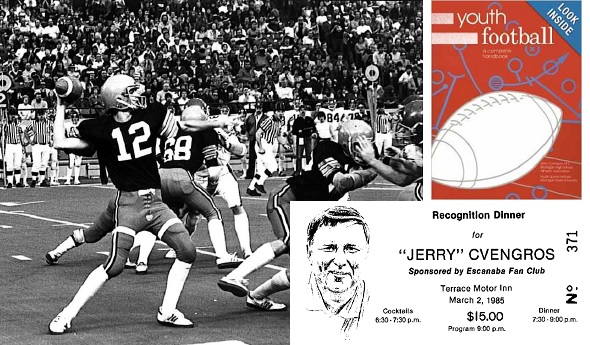
Cvengros Leaves Lasting Impact
By
Geoff Kimmerly
MHSAA.com senior editor
April 1, 2014
Retired Associate Director Jerry Cvengros, who served at the Michigan High School Athletic Association for more than 13 years after three decades at Escanaba High School, died Monday evening in Lansing. He was 80.
As lead assistant to Executive Director John E. “Jack” Roberts from August 1988 until retiring in January 2002, Cvengros served as director of football and briefly hockey in addition to coordinating the Program of Athletic Coaches Education (PACE), presenting annual in-service training for administrators and serving as MHSAA liaison to statewide principals, athletic directors and coaches associations.
 He came to the MHSAA after 30 years at Escanaba, where he taught, coached, served as athletic director and later principal during a tenure stretching from August 1958 through July 1988. While at Escanaba, Cvengros also represented Upper Peninsula Class A and B schools on the MHSAA Representative Council from 1983-88 and served as the Council’s president from 1986-88.
He came to the MHSAA after 30 years at Escanaba, where he taught, coached, served as athletic director and later principal during a tenure stretching from August 1958 through July 1988. While at Escanaba, Cvengros also represented Upper Peninsula Class A and B schools on the MHSAA Representative Council from 1983-88 and served as the Council’s president from 1986-88.
Cvengros received the MHSAA’s Charles E. Forsythe Award in 2000 in recognition of his many and significant contributions to interscholastic athletics.
“During his lifetime, Jerry Cvengros impacted every area of interscholastic athletics as a coach, athletic director, principal and then associate director of the MHSAA," Roberts said. “He was the perfect combination of fairness, toughness and diplomacy, able to draw on a vast knowledge of MHSAA rules and an understanding of educational athletics fostered by his various experiences.
“Jerry was known and respected statewide for his dedication, and his contributions have had a lasting impact.”
Cvengros built an elite football program at Escanaba as varsity head coach from 1962-84, leading the Eskymos to a 161-42-3 record, a Class A runner-up finish in 1979 and the MHSAA championship in 1981. That team remains the only Class A/Division 1 team from the Upper Peninsula to win an MHSAA football title. Cvengros was inducted into the Michigan High School Football Coaches Association Hall of Fame and served on its original Board of Directors.
His 1979 team fell to Detroit Catholic Central 32-7, but he brought the Eskymos back to the Finals for a 16-6 win over Fraser two seasons later. Cvengros' championship lineup included quarterback Kevin Tapani, who would go on to pitch for the Minnesota Twins among five major league clubs, and tailback Dean Altobelli, who later played at Michigan State University. The title run included a 15-14 Semifinal win over Dearborn Fordson that included a savvy two-point conversion call by Cvengros, who wanted to avoid overtime after a late score drew Escanaba to within a point of tying the score.
As the MHSAA’s director of football, Cvengros was instrumental in creating the current playoff format that expanded the field from 128 to 256 teams beginning with the 1999 season. He also co-authored “Youth Football: A Complete Handbook,” a guide to coaching at that level.
Among many additional honors, Cvengros was inducted into the Upper Peninsula Sports Hall of Fame and Michigan High School Coaches Association Hall of Fame and received the Distinguished Service Award from the Michigan Interscholastic Athletic Administrators Association. The National Federation of State High School Associations twice awarded Cvengros with a Citation – the NFHS’ highest honor – for his service as a coach and then as a member of the MHSAA staff.
Since his retirement, Cvengros and his wife Shelley have continued to reside in Okemos. A visitation will take place beginning at 10 a.m. Monday, April 7, at St. Martha Parish in Okemos, with a funeral Mass to follow at 11 a.m.
Cvengros was a 1951 graduate of Ironwood High School and went on to study and play football at the University of Wisconsin in Madison. He earned his bachelor’s degree in secondary education and teaching from the University of Wisconsin-Superior and a master’s from Northern Michigan University.
He taught English, history and physical education at Escanaba High School and also coached basketball and track and field. He became the school’s athletic director in 1970, added the duties of activities director in 1975 and became principal in 1983.
Cvengros is survived by his wife and children Michael, Steven and David, and seven grandchildren. He was preceded in death by his daughter Lee Ann (Cvengros) Swasey in May 2013.
PHOTOS: (Clockwise from left) Escanaba quarterback Mike Beveridge fires a pass during the 1979 Class A Final; Cvengros co-authored a book on coaching youth football; Cvengros was celebrated once more in Escanaba following his final season as football coach.
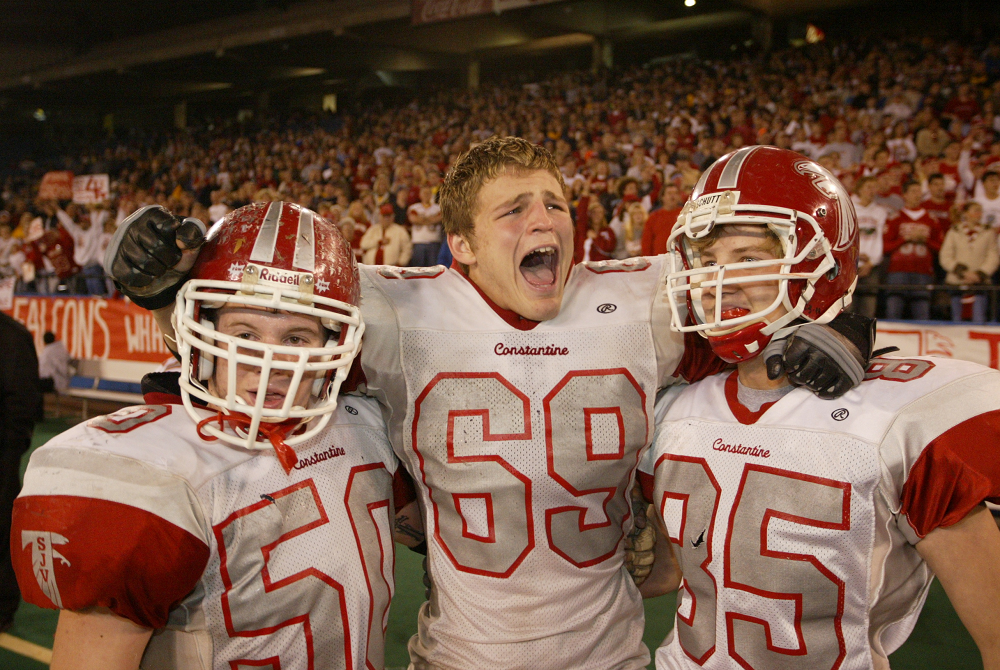
Constantine Celebrates 100th Season, Renowned for Continuity & Signature Wing-T
By
Scott Hassinger
Special for MHSAA.com
September 6, 2023
CONSTANTINE – Bennett Vandenberg and Cohen McGee are just like any other high school football players.
 Both Constantine seniors have high aspirations of winning a fifth-straight Southwestern Athletic Conference Lakeshore title and reaching the postseason.
Both Constantine seniors have high aspirations of winning a fifth-straight Southwestern Athletic Conference Lakeshore title and reaching the postseason.
But Vandenberg and McGee, along with their Falcons teammates, will be celebrating more than victories and a potential playoff appearance this fall.
Constantine, a community located in southern St. Joseph County, is observing the 100th season of the school's football program.
The Falcons (1-1) will commemorate the occasion Saturday, Oct. 7, with a home game against SAC Lakeshore foe Kalamazoo United. Kickoff time from Sweetland Stadium is 1 p.m. The game will be followed by a community luncheon and program in the high school at which time past coaches, players and the program's biggest accomplishments will be recognized and celebrated.
Vandenberg, a starting fullback/tight end and outside linebacker, and McGee, an offensive lineman and linebacker, are both looking forward to the rest of the season and continuing Constantine's strong tradition on the gridiron.
"We have a huge football tradition here at Constantine. This year we're celebrating the 100th year, and we have some of the oldest living players coming back to help celebrate after that game with United,” said Vandenberg, a three-year starter and Finals placer his junior year in wrestling and track & field. “Our community is all about football. We know we have to go out there and represent our school and community the right way."
McGee is following in the footsteps of his older brother Carter.
"There are lots of things that people who follow Constantine football don't see, like the hours of dedication and work we put in during the offseason. That's where we make our strides and become better as a program," McGee said.
The football stadium at Constantine is named after Dr. George Sweetland, a physician in the community, who donated money for a football stadium to be built with a hill completely circling the facility.
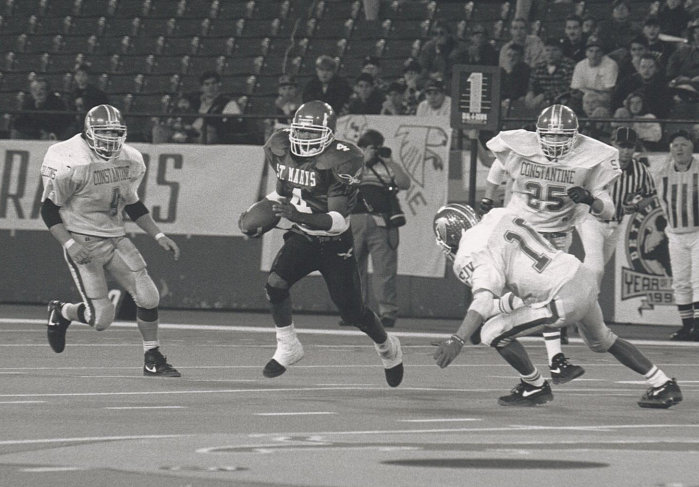 Sweetland, who moved to Constantine in 1916 to take over his brother's medical practice after the latter was killed in a car crash, reportedly allowed patients to work off their medical bills by helping with the stadium's construction.
Sweetland, who moved to Constantine in 1916 to take over his brother's medical practice after the latter was killed in a car crash, reportedly allowed patients to work off their medical bills by helping with the stadium's construction.
Constantine, which played its first football game in 1924 and finished as county champs at 4-2 under coach Lew Lake, sports an all-time record of 481 wins and 221 losses with 11 ties. During that span, the Falcons have enjoyed 11 unbeaten seasons, including Robert Finlay's 1937 squad that went 8-0 and was unscored upon.
Coaching longevity is one of the biggest factors allowing Constantine to be as successful as it has been, especially during the program's modern era. The Falcons have had just four head coaches since 1964.
Mike Messner, a three-sport athlete and 1965 Constantine graduate, later served as the school's athletic director from 1992-2016.
Messner pointed to Meredith 'Spud' Huston, Constantine's football coach from 1958-1961, as one of the first individuals influential in setting the wheels in motion for the program's future success.
Huston guided the Falcons to their first league title in 1961.
Constantine's four winningest coaches – Dave Horn, Tim Baker, Ken Rimer and Shawn Griffith – are all honorary members of the Michigan High School Football Coaches Association's Hall of Fame.
Horn, who died earlier this summer, served two stints as Constantine's head coach from 1964-1981 and 1987-1989 while compiling a 116-65-4 record.
Baker (129-30) coached Constantine for 15 seasons and guided the Falcons to a record of 129-30. Under Baker, the Falcons were Division 6 champs in 2004 and Finals runners-up in 1994 (Class CC) and 2002 (Division 5).
"Dave (Horn) was a genuinely great person who coached 21 years. He could get upset at you on the field, but he was a very kind, storyteller and a thoughtful guy who really cared about others," Messner said.
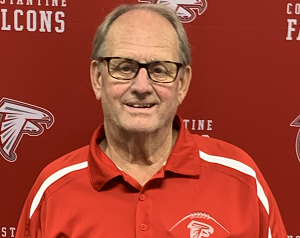 "In the modern coaching era, Tim (Baker) really believed in lifting weights, making kids stronger and developing kids into good football players. He was diligent, hardworking and put a lot of time into the program while missing a lot of family functions. He concentrated on doing the best job he could. Ken (Rimer) was right there in the same mode as Tim. When they started coaching together, they wanted a program that kids at Constantine could be proud of. Things started really happening, and ever since then the program has been strong. We have coaches who want Constantine to be successful on the field."
"In the modern coaching era, Tim (Baker) really believed in lifting weights, making kids stronger and developing kids into good football players. He was diligent, hardworking and put a lot of time into the program while missing a lot of family functions. He concentrated on doing the best job he could. Ken (Rimer) was right there in the same mode as Tim. When they started coaching together, they wanted a program that kids at Constantine could be proud of. Things started really happening, and ever since then the program has been strong. We have coaches who want Constantine to be successful on the field."
Rimer spent 28 years as an assistant coach under Baker and current head coach Shawn Griffith. Constantine compiled a win-loss mark of 242-70 with Rimer as an assistant.
Griffith, who took over as Constantine's head coach in 2005, is the Falcons’ all-time winningest coach at 156-53. Under Griffith's tutelage, the Falcons have made 17 playoff appearances, with back-to-back Division 6 runners-up finishes in 2011 and 2012.
"The history of Constantine football kind've coincides with everything else here in the community. This is my 32nd year overall as a coach in this program. But I also have several memories from when I was in high school at Mendon as a player going up against Constantine," Griffith said.
"When you talk about any community our size, you immediately look at family names. We have another Stears (Lucas) on this year's team. Mike (Messner) told me there have been over 20 from the Stears family that have worn the Falcon uniform. It doesn't stop there. I look at the number of kids we have in the locker room this year, and I realize that I've coached many of their brothers, fathers and uncles. We look at the program as one big family. This program has helped to raise a lot of young men in the area these last few years. The community has been extremely supportive of the program as well."
Constantine won 19 league championships as a member of the St. Joseph Valley League from 1952-2007. That league consisted of Constantine, White Pigeon, Schoolcraft, Centreville, Colon, Climax-Scotts, Burr Oak and Mendon. Bronson and Battle Creek St. Philip became members later after Climax-Scotts and Burr Oak left to join the Southern Central Athletic Association. Eventually, the SJV disbanded due to conference realignment and declining enrollment among its smaller schools.
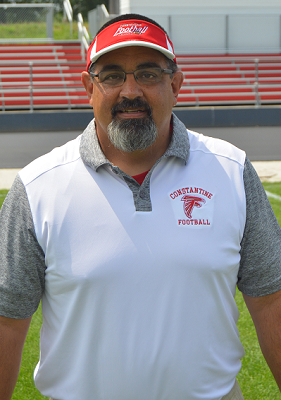 At one time, Constantine played in one of the longest-running rivalries in state football history. The Falcons and archrival White Pigeon began playing one another in 1924 and Constantine held a 47-35-6 in the rivalry, with wins in the final 17 meetings before the series ended after the 2007 season.
At one time, Constantine played in one of the longest-running rivalries in state football history. The Falcons and archrival White Pigeon began playing one another in 1924 and Constantine held a 47-35-6 in the rivalry, with wins in the final 17 meetings before the series ended after the 2007 season.
Messner recalls the 1981 meeting between White Pigeon and Constantine as one of the most memorable. The game was played at the Sweetland Stadium in Constantine, and there were more than 5,000 people in attendance.
"White Pigeon came into that game unscored upon and ranked No. 1 in the state. We were undefeated, but nobody was saying anything about us, but they were really talking (White Pigeon) up," Messner said. "(White Pigeon) had brought over 1,000 balloons with them and hid them behind the bleachers. They were going to launch them every time they scored. They never scored, and we beat them 21-0. It was such a sad moment for both schools when they had to stop playing one another in football."
After the SJV dissolved, Constantine and Schoolcraft became members of the Kalamazoo Valley Athletic Association from 2008-2014 before leaving to join the Southwestern Athletic Conference for the 2015 season. Constantine begins its ninth season competing in the SAC Lakeshore against the likes of Watervliet, Allegan, Kalamazoo United, South Haven and Parchment.
Messner also lists several playoff games as big moments in Constantine's football history.
"Our first playoff team (1991) was a big year, and our first state finals appearance (1994) was another," Messner added.
Constantine lost to Orchard Lake St. Mary's (35-7) in the 1994 Class CC Final, but knocked off heavily-favored Fennville (50-0) in their Pre-Regional and Whittemore-Prescott (54-6) in a Semifinal to get there.
"Both teams were considerably bigger than us up front on the line. Fennville had a really good quarterback (Frank Alfieri) and Whittemore-Prescott had a great tailback (Tom 'Touchdown' Tyson) that our much smaller guys managed to shut down," Messner said. "Then there was a 13-7 win we had in the 2002 Regional Finals over heavily-favored Muskegon Oakridge."
But perhaps the 2004 Semifinal deemed 'The Miracle in Marshall' will go down as the most memorable game in Constantine history. In that contest, Constantine trailed Monroe St. Mary Catholic Central 27-14 with a little more than six and a half minutes to go in the fourth quarter.
The Falcons scored twice during those last few minutes, including a last-second 32-yard TD pass from Aaron Baker to Sean Wolf caught in the end zone that tied the game at 27-27 with one second left. Jordan Williams booted the PAT as time expired, giving the Falcons a 28-27 win.
Constantine went on to defeat Suttons Bay 34-13 in the Division 6 Final the following week.
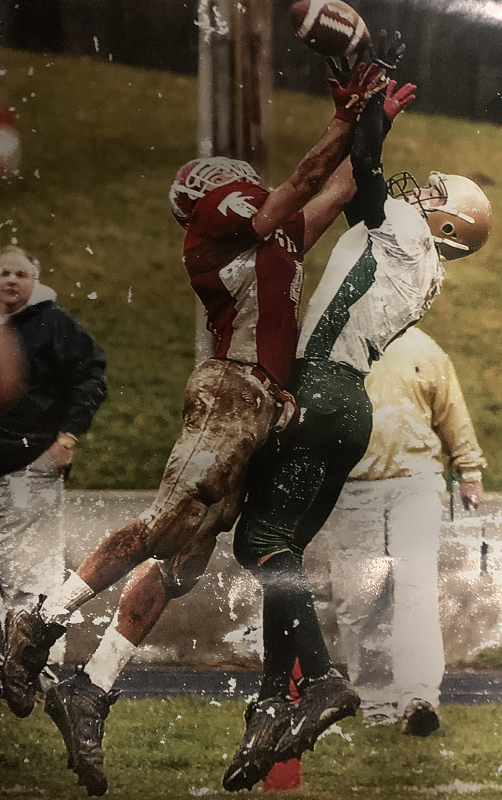 From 1991-2015, Constantine attained at least seven wins for 25 consecutive years, which is a state record. The Falcons made 18 consecutive playoff appearances from 1999-2016 before suffering their most recent losing season in 2017, when they finished 3-6.
From 1991-2015, Constantine attained at least seven wins for 25 consecutive years, which is a state record. The Falcons made 18 consecutive playoff appearances from 1999-2016 before suffering their most recent losing season in 2017, when they finished 3-6.
Constantine's overall playoff record stands at 49-25 with 26 total appearances.
It was Griffith, who played his high school football at Mendon for Class D championship-winning coach Roger Smith and his then-assistant John Schwartz (who would later lead the Hornets to 10 more Finals titles) who convinced Baker the Falcons should transition from the I-Formation to the Wing-T offense.
After much discussion and argument among the coaching staff, Baker reluctantly agreed to Griffith's idea.
"I joined the coaching staff in 1992 as offensive coordinator. As a coaching staff, we really came into our own and made our first run to the Finals in 1994. In the late ’90s we had some really good teams, but still didn't quite have a real identity. During that time we ran into some really good Wing-T football teams," Griffith said.
"We started noticing that we had a real hard time stopping these teams that ran the Wing-T like Muskegon Orchard View, Hopkins and Battle Creek Pennfield. So I came to Tim (Baker) after the 2001 season with the idea of changing the offense. We knew we had a tremendous group of running backs coming up through the program for the next seven or eight years. I approached him about running the Wing-T. He wasn't real receptive at first about running it. But after sitting down with other Wing-T coaches like John Shilito (Muskegon Orchard View) and Irv Sigler (Belding), he agreed to give it a try."
Constantine began running the Wing-T at the start of the 2002 season.
"Once you get known for running an offense like this, it kind've becomes your niche. I get emails from people all over the United States wanting me to come teach them this offense at camps. Here at Constantine, we've been fortunate to rack up quite a few wins since we installed this offense. Our kids can really talk the Wing-T game, and we didn't really have that before when we were running our I-formation and single-back stuff," Griffith said.
"The blocking schemes have become ingrained in our kids. They do a great job of knowing where they are supposed to be and who they are supposed to block. Another thing I really like about the Wing-T is it's a lineman's offense. Our linemen get a lot of credit, which they deserve. There is a certain toughness to this offense as well. It's allowed us to use kids who might be smaller and less athletic, but still allows us to be successful because they have developed a certain toughness."
Griffith credits a lot of that toughness to his players who compete on the Falcons' wrestling team during the winter sports season. Constantine’s wrestling program also has enjoyed a long run of success, including a Class C-D title in 1993 and Division 3 runner-up finish in 2002. The Falcons have won Team Regional titles three straight seasons.
 Scott Hassinger is a contributing sportswriter for Leader Publications and previously served as the sports editor for the Three Rivers Commercial-News from 1994-2022. He can be reached at [email protected] with story ideas for Berrien, Cass, St. Joseph and Branch counties.
Scott Hassinger is a contributing sportswriter for Leader Publications and previously served as the sports editor for the Three Rivers Commercial-News from 1994-2022. He can be reached at [email protected] with story ideas for Berrien, Cass, St. Joseph and Branch counties.
PHOTOS (Top) Constantine players celebrate near the end of their 2004 championship win at Pontiac Silverdome. (2) A trio of Constantine defenders pursue Orchard Lake St. Mary’s Phil Martin (4) during the 1994 Class CC Final. (3) Longtime Constantine athletic director Mike Messner. (4) Current Constantine head varsity coach Shawn Griffith. (5) The 2004 “Miracle in Marshall” remains one of the most memorable games in Constantine football history. (Finals photos from MHSAA archive. “Miracle in Marshall” photo by Dick Carter. Messner and Griffith photos gathered by Scott Hassinger.)

